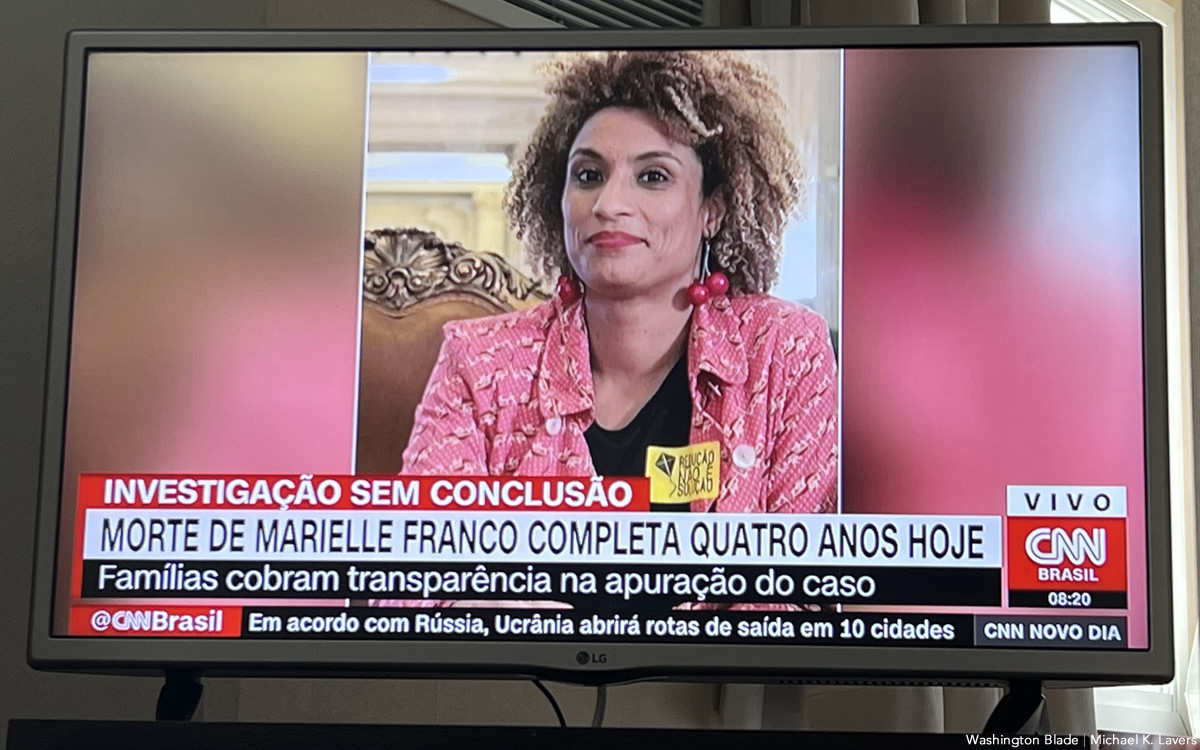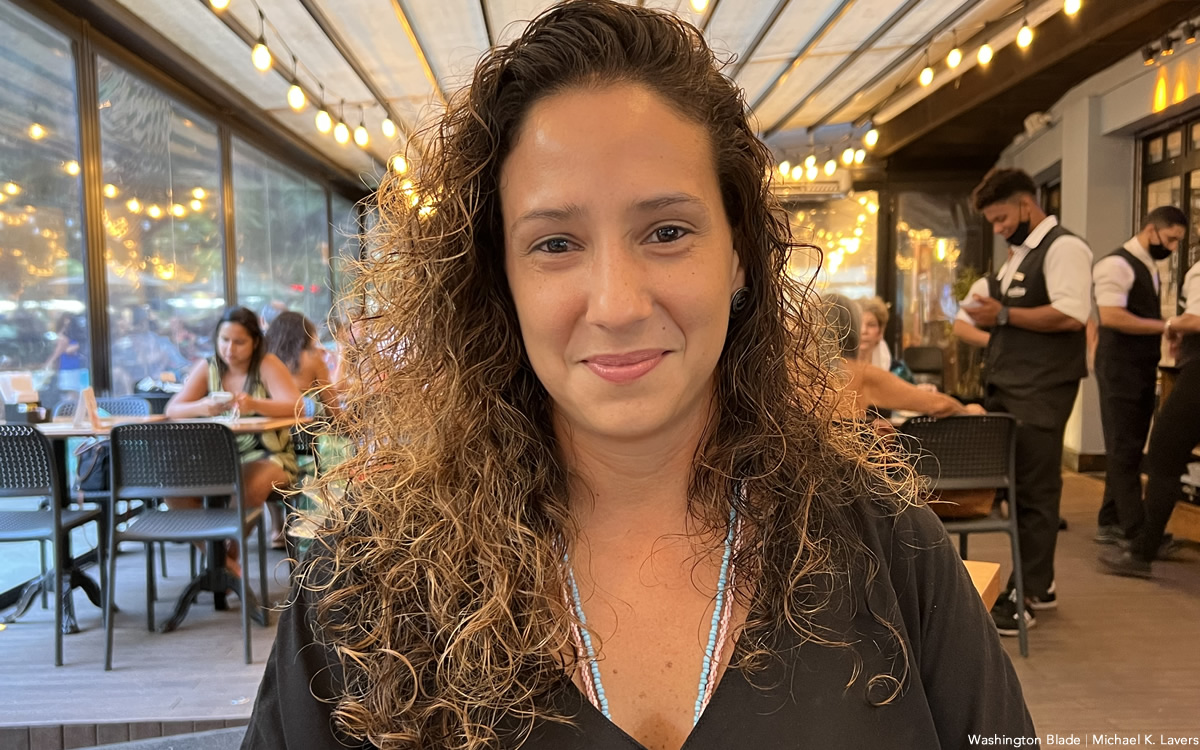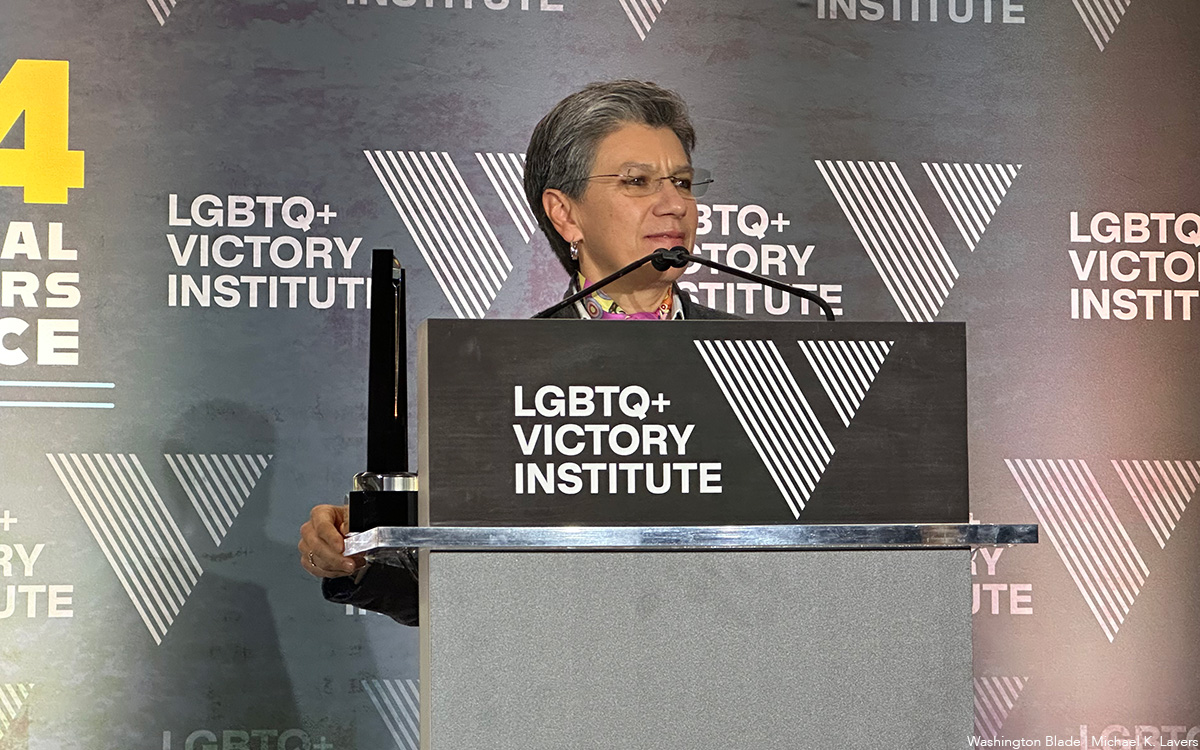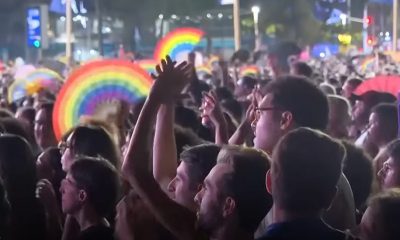South America
Former firefighter arrested in connection with Rio councilwoman’s murder
Marielle Franco was a bisexual woman of African descent

Brazilian police on Monday arrested a third person in connection with the 2018 murder Rio de Janeiro Municipal Councilwoman Marielle Franco and her driver.
Reuters reported officers arrested Maxwell Simões Correia, a former firefighter who allegedly hid the guns that two former police officers used to shoot Franco and Anderson Gomes in Rio’s Lapa neighborhood on March 14, 2018.
Franco, a bisexual woman and single mother of African descent, grew up in Maré, a favela in the northern part of Rio that is close to the city’s international airport. Franco, among other things, was an outspoken critic of police raids in Rio’s favelas that have left hundreds of people dead.
Authorities in 2019 arrested two former police officers in connection with Franco’s murder.
Reuters reported one of them, Elcio de Queiroz, who prosecutors say drove the car that he and Ronnie Lessa, his alleged co-conspirator, used in the shooting, has entered into a plea agreement.
Lessa lived in the same large condominium complex in Rio’s exclusive Barra da Tijuca neighborhood in which former President Jair Bolsonaro lives.
Bolsonaro, a former Brazilian Army captain who represented Rio in Congress for decades before he became president, had yet to be elected when Franco and Gomes were murdered.
Bolsonaro has strongly denied media reports that indicate Lessa visited his home before the killings. Franco’s widow, Rio Municipal Councilwoman Mônica Benício, during a March 2022 interview with the Washington Blade described the fact that Lessa and Bolsonaro were neighbors as “just a coincidence.”

Lessa and Queiroz remain in custody.
Justice Minister Flávio Dino on Monday said during a press conference in Brasília, the Brazilian capital, that Queiroz has provided investigators with information they can use to help identify others who plotted to assassinate Franco and Gomes.
“We are close to solving this horrendous crime,” said Dino.
Benício on Monday praised Dino and President Luiz Inácio Lula da Silva for their continued efforts to investigate Franco’s murder.
“I would like to thank Minister Flavio Dino and President Lula for their efforts to seek a solution to this crime that has shaken our state’s structures,” tweeted Benício. “Who had Marielle killed? I have faith and conviction that we will have that answer.”
Agradeço ao empenho do ministro @FlavioDino e do presidente @LulaOficial em buscar uma solução para esse crime que abalou as estruturas do nosso Estado. Quem mandou matar Marielle? Tenho fé e convicção de que teremos essa resposta.
— Monica Benicio 🏳️🌈 (@monica_benicio) July 24, 2023
Benício on Monday sent the Washington Blade this statement.
“The Federal Police and Public Prosecutor’s Office operation renews our hopes in having an answer about who are the principals and their motivations for the murder of Marielle and Anderson.
The role of the FP in investigations, in collaboration with the MPRJ (The State of Rio de Janeiro’s Public Ministry), has been fundamental, But our struggle as family members and civil society, which formed a large task force over these five years, is what has made this case stand out.
Maxwell’s arrest, today, is an important step towards the accountability of others directly involved in the execution of the crime, but I hope that the PF and the Public Prosecutor’s Office continue in this mutual cooperation action to take Ronnie Lessa and Elcio Queiroz to trial later this year. The pact of silence between these killers has been broken, it is necessary to act with agility and prudence to reach the principals and their motivations. Answering who ordered Marielle’s death and why is essential for us to restore democracy in our country. I am hopeful that moment is approaching.”
Colombia
Colombia avanza hacia la igualdad para personas trans
Fue aprobado en Comisión Primera de la Cámara la Ley Integral Trans

En un hecho histórico para los derechos humanos en Colombia, la Comisión Primera de la Cámara de Representantes aprobó en primer debate el Proyecto de Ley 122 de 2024, conocido como la Ley Integral Trans, que busca garantizar la igualdad efectiva de las personas con identidades de género diversas en el país. Esta iniciativa, impulsada por más de cien organizaciones sociales defensoras de los derechos LGBTQ, congresistas de la comisión por la Diversidad y personas trans, representa un paso decisivo hacia el reconocimiento pleno de derechos para esta población históricamente marginada.
La Ley Integral Trans propone un marco normativo robusto para enfrentar la discriminación y promover la inclusión. Entre sus principales ejes se destacan el acceso a servicios de salud con enfoque diferencial, el reconocimiento de la identidad de género en todos los ámbitos de la vida, la creación de programas de empleo y educación para personas trans, así como medidas para garantizar el acceso a la justicia y la protección frente a violencias basadas en prejuicios.
Detractores hablan de ‘imposición ideológica
Sin embargo, el avance del proyecto no ha estado exento de polémicas. Algunos sectores conservadores han señalado que la iniciativa representa una “imposición ideológica”. La senadora y precandidata presidencial María Fernanda Cabal anunció públicamente que se opondrá al proyecto de Ley Integral Trans cuando llegue al Senado, argumentando que “todas las personas deben ser tratadas por igual” y que esta propuesta vulneraría un principio constitucional. Estas declaraciones anticipan un debate intenso en las próximas etapas legislativas.
El proyecto también establecelineamientos claros para que las instituciones públicas respeten el nombre y el género con los que las personas trans se identifican, en concordancia con su identidad de género, y contempla procesos de formación y sensibilización en entidades estatales. Además, impulsa políticas públicas en contextos clave como el trabajo, la educación, la cultura y el deporte, promoviendo una vida libre de discriminación y con garantías plenas de participación.
¿Qué sigue para que sea ley?
La Ley aún debe superar varios debates legislativos, incluyendo la plenaria en la Cámara y luego el paso al Senado; pero la sola aprobación en Comisión Primera ya constituye un hito en la lucha por la igualdad y la dignidad de las personas trans en Colombia. En un país donde esta población enfrenta altos niveles de exclusión, violencia y barreras estructurales, este avance legislativo renueva la esperanza de una transformación real.
Desde www.orgullolgbt.co, celebramos este logro, invitamos a unirnos en esta causa impulsándola en los círculos a los que tengamos acceso y reiteramos nuestro compromiso con la visibilidad, los derechos y la vida digna de las personas trans. La #LeyIntegralTrans bautizada “Ley Sara Millerey” en honor de la mujer trans recientemente asesinada en Bello, Antioquia (ver más aquí); no es solo una propuesta normativa: es un acto de justicia que busca asegurar condiciones reales para que todas las personas puedan vivir con libertad, seguridad y respeto por su identidad.
Colombia
Claudia López running for president of Colombia
Former Bogotá mayor married to Sen. Angélica Lozano

Former Bogotá Mayor Claudia López has announced she is running for president of Colombia.
“We begin today and we will win in a year,” she said in a social media post on June 3.
View this post on Instagram
López, 55, was a student protest movement leader, journalist, and political scientist before she entered politics. López returned to Colombia in 2013 after she earned her PhD in political science at Columbia University.
López in a speech she gave last December after the LGBTQ+ Victory Institute honored her at its annual International LGBTQ Leaders Conference in D.C. noted Juan Francisco “Kiko” Gomez, a former governor of La Guajíra, a department in northern Colombia, threatened to assassinate her because she wrote about his ties to criminal gangs.
A Bogotá judge in 2017 convicted Gómez of ordering members of a paramilitary group to kill former Barrancas Mayor Yandra Brito, her husband, and bodyguard and sentenced him to 55 years in prison.
López in 2014 returned to Colombia, and ran for the country’s Senate as a member of the center-left Green Alliance party after she recovered from breast cancer. López won after a 10-week campaign that cost $80,000.
López in 2018 was her party’s candidate to succeed then-President Juan Manuel Santos when he left office. López in 2019 became the first woman and first lesbian elected mayor of Bogotá, the Colombian capital and the country’s largest city.
López took office on Jan. 1, 2020, less than a month after she married her wife, Colombian Sen. Angélica Lozano. (López was not out when she was elected to the Senate.) López’s mayorship ended on Dec. 31, 2023. She was a 2024 Harvard University Advance Leadership Initiative fellow.
The first-round of Colombia’s presidential election will take place on May 31, 2026.
The country’s 1991 constitution prevents current President Gustavo Petro from seeking re-election.
López declared her candidacy four days before a gunman shot Sen. Miguel Uribe, a member of the opposition Democratic Center party who is seen as a probable presidential candidate, in the head during a rally in Bogotá’s Fontibón neighborhood.
She quickly condemned the shooting. López during an interview with the Washington Blade after the Victory Institute honored her called for an end to polarization in Colombia.
“We need to listen to each other again, we need to have a coffee with each other again, we need to touch each other’s skin,” she said.
López would be Colombia’s first female president if she wins. López would also become the third openly lesbian woman elected head of government — Jóhanna Sigurðardóttir was Iceland’s prime minister from 2009-2013 and Ana Brnabić was Serbia’s prime minister from 2017-2024.
Chile
Gay pharmacist’s murder sparks outrage in Chile
Francisco Albornoz’s body found in remote ravine on June 4

The latest revelations about the tragic death of Francisco Albornoz, a 21-year-old gay pharmacist whose body was found on June 4 in a remote ravine in the O’Higgins region 12 days after he disappeared, has left Chile’s LGBTQ community shocked.
The crime, which was initially surrounded by uncertainty and contradictory theories, has taken a darker and more shocking turn after prosecutors charged Christian González, an Ecuadorian doctor, and José Miguel Baeza, a Chilean chef, in connection with Albornoz’s murder. González and Baeza are in custody while authorities continue to investigate the case.
The Chilean Public Prosecutor’s Office has pointed to a premeditated “criminal plan” to murder Albornoz.
Rossana Folli, the prosecutor who is in charge of the case, says Albornoz died as a a result of traumatic encephalopathy after receiving multiple blows to the head inside an apartment in Ñuñoa, which is just outside of Santiago, the Chilean capital, early on May 24. The Prosecutor’s Office has categorically ruled out that Albornoz died of a drug overdose, as initial reports suggested.
“The fact that motivates and leads to the unfortunate death of Francisco is part of a criminal plan of the two defendants, aimed at ensuring his death and guaranteeing total impunity,” Folli told the court. “The seriousness of the facts led the judge to decree preventive detention for both defendants on the grounds that their freedom represents a danger to public safety.”
Prosecutors during a June 7 hearing that lasted almost eight hours presented conservations from the suspects’ cell phones that they say showed they planned the murder in advance.
“Here we already have one (for Albornoz.) If you bring chloroform, drugs, marijuana, etc.,” read one of the messages.
Security cameras captured the three men entering the apartment where the murder took place together.
Hours later, one of the suspects left with a suitcase and a shopping cart to transport Albornoz’s body, which had been wrapped in a sleeping bag. The route they followed to dispose of the body included a stop to buy drinks, potato chips, gloves, and a rope with which they finally descended a ravine to hide it.
Advocacy groups demand authorities investigate murder as hate crime
Although the Public Prosecutor’s Office has not yet officially classified the murder as a hate crime, LGBTQ organizations are already demanding authorities investigate this angle. Human rights groups have raised concerns over patterns of violence that affect queer people in Chile.
The Zamudio Law and other anti-discrimination laws exist. Activists, however, maintain crimes motivated by a person’s sexual orientation or gender identity are not properly prosecuted.
“This is not just a homicide, it is the cruelest expression of a society that still allows the dehumanization of LGBTQ+ people,” said a statement from Fundación Iguales, one of Chile’s main LGBTQ organizations. “We demand truth, justice, and guarantees of non-repetition.”
The Movement for Homosexual Integration and Liberation (Movilh), meanwhile, indicated that “since the first day the family contacted us, we have been in conversations with the Prosecutor’s Office so that this fatal outcome is thoroughly investigated, including the possible existence of homophobic motivations or components.”
The investigation into Albornoz’s murder continues, and the court has imposed a 90-day deadline for authorities to complete it.
-

 U.S. Supreme Court4 days ago
U.S. Supreme Court4 days agoSupreme Court to consider bans on trans athletes in school sports
-

 Out & About4 days ago
Out & About4 days agoCelebrate the Fourth of July the gay way!
-

 Virginia4 days ago
Virginia4 days agoVa. court allows conversion therapy despite law banning it
-

 Opinions4 days ago
Opinions4 days agoCan we still celebrate Fourth of July this year?












